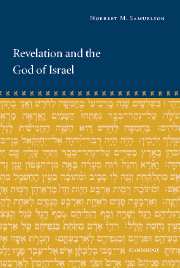Introduction
Published online by Cambridge University Press: 22 September 2009
Summary
This book is a constructive study of the concept of revelation as it emerges from the Hebrew Scriptures and is interpreted in Jewish philosophy. The first part of the book is an attempt to answer the question, what is the best possible understanding of what revelation is? “Best possible” here means most detailed and most coherent in its details. As such, the first part is a study in intellectual history. Special attention is given to the conception of the God of revelation in the Hebrew Scriptures as classical or medieval Jewish theological philosophers, such as Moses Maimonides, and modern Jewish philosophical theologians, such as Martin Buber and Franz Rosenzweig, subsequently interpret it. Its conclusion is the formulation of the concept of revelation that will be the subject for the second part.
The second part of the book is a critical study of the concept of revelation in the light of possible challenges to its affirmation from contemporary academic disciplines. It is an attempt to answer the question, is it reasonable to affirm belief in revelation? What “reasonable belief” means is in itself somewhat complex and will be discussed within the body of the book, especially in the concluding chapter. As such, the second part is a study in the philosophy of religion. For now, suffice it to say that a particular belief is “reasonable” if it is logically coherent and there is no contrary belief whose probability is greater.
- Type
- Chapter
- Information
- Revelation and the God of Israel , pp. 1 - 8Publisher: Cambridge University PressPrint publication year: 2002

